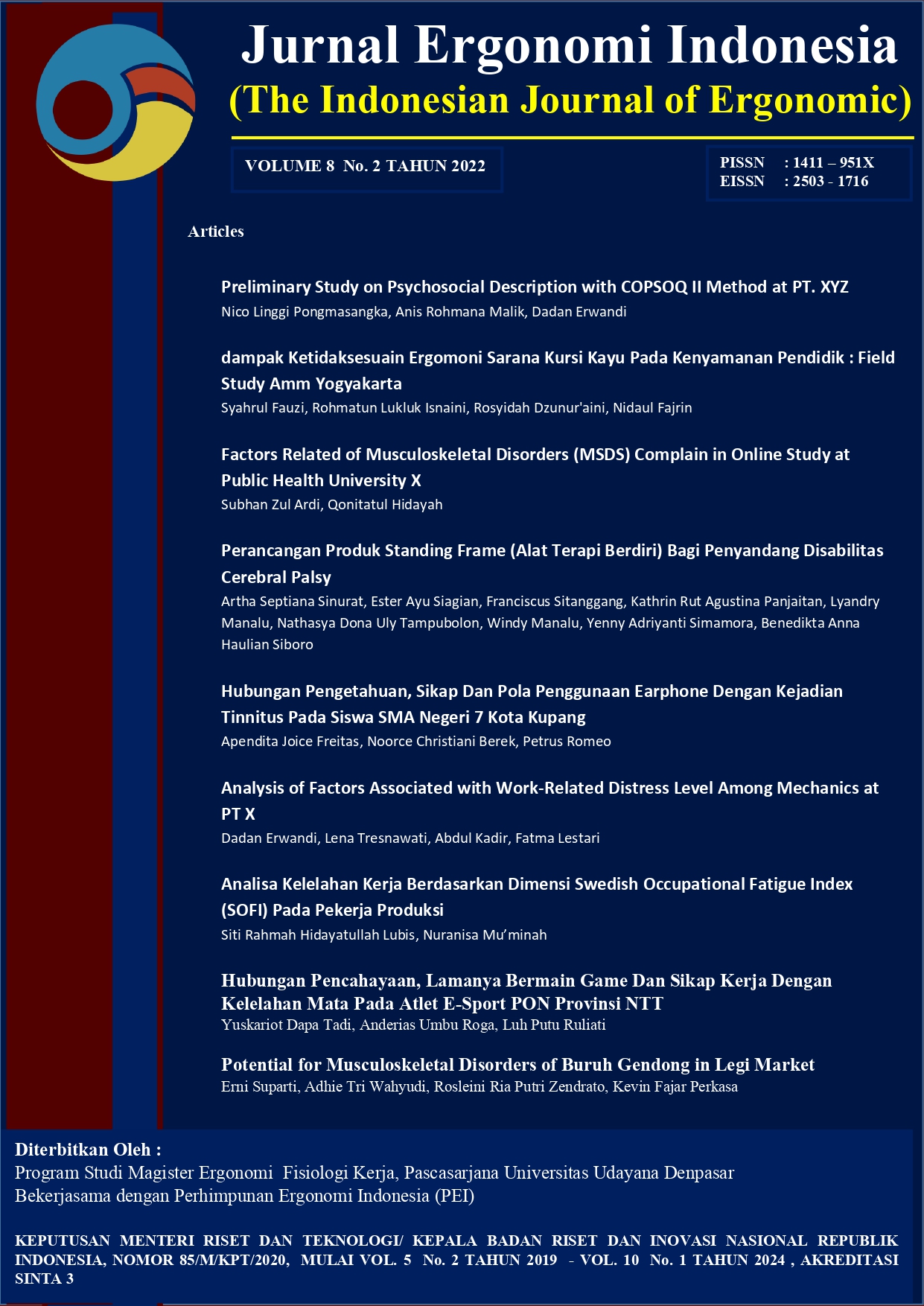Preliminary Study on Psychosocial Description with COPSOQ II Method at PT. XYZ
Abstract
Psychosocial risk factors can be stressors that have an impact on increasing work stress cases in a workplace. These risk factors cause various kinds of problems in workers such as occupational diseases and work accidents. One of the psychosocial measurement models in the workplace is the Copenhagen Psychosocial Questionnaire (COPSOQ) II. The sampling technique in this study used the Exhaustive Sampling Technique which was carried out on October 25 - 28, 2021 at PT. XYZ the number of samples is 34 workers. The results of this study found that the percentages were almost balanced between the good and bad categories, namely "good" psychosocial conditions 41.2% (14 people) and "bad” by 58.8% (20 people). The psychosocial aspect that has the highest percentage in the "bad" category is the Health and Welfare Aspect with a percentage of 76.50% (26 people). In the results of the bivariate test, it was found that there was a significant relationship between psychosocial aspects and emotional risk factors experienced by employees at PT. XYZ
Downloads
References
Baek, K., Yang, S., Lee, M., & Chung, I. (2018). The Association of Workplace Psychosocial Factors and Musculoskeletal Pain Among Korean Emotional Laborers. Safety and Health at Work, 9(2), 216–223. https://doi.org/10.1016/J.SHAW.2017.09.004
Beheshtifar, M. (2012). Effect of Psychosocial Work Factors on workplace. 4(2), 25–33.
Buyung, H., Safrizal, A., Eliyana, A., Firdaus, M., & Rachmawati, P. D. (2020). The Effect of Participatory Leadership on Performance through Psychological Empowerment and Trust-in-Supervisors. In Systematic Reviews in Pharmacy (Vol. 11, Issue 11).
Dhamanti, I., Rachman, T., Ardian, M., Ramadhan, N. A., Zairina, E., & Fauziningtyas, R. (2021). Development of a Patient Safety-training Program for Health Workers in Indonesia: Perspectives of Health Workers and Hospital Stakeholders. In Malaysian Journal of Medicine and Health Sciences (Vol. 17, Issue 2).
Erwandi, D. (2020). Risiko Psikososial pada Pekerja di Pertambangan Batu Bara Universitas Indonesia. https://www.ui.ac.id/risiko-psikososial-pada-pekerja-di-pertambangan-batu-bara/
Fitriantini, R., & Nurmayanti, S. (2020). Pengaruh Beban Kerja, Kepuasan Kerja dan Stres Kerja Terhadap Turnover Intention Tenaga Kesehatan Berstatus Kontrak di RSUD Kota Mataram 8(1).
Handayani, Tri Retno Wuri. (2008). Hubungan antara Sikap Penyelesaian Masalah dan Kebermaknaan Hidup dengan Somatisasi pada Wanita Karir. Skripsi S1 Fakultas Psikologi, Universitas Muhammadiyah, Surakarta.
Kristensen, Tage Søndergård. (2010). A questionnaire is more than a questionnaire. In Scandinavian Journal of Public Health (Vol. 38, Issue SUPPL. 3, pp. 149–155). https://doi.org/10.1177/1403494809354437
Kustanto, H., Eliyana, A., Harum Santri Mumpuni, J., & Rahmawati Gunawan, D. (2020). The Moderation Role of Psychological Empowerment on Innovative Work Behaviour. In Systematic Reviews in Pharmacy (Vol. 11, Issue 8).
Nursalam, N., Fibriansari, R. D., Yuwono, S. R., Hadi, M., Efendi, F., & Bushy, A. (2018). Development of an empowerment model for burnout syndrome and quality of nursing work life in Indonesia. https://doi.org/10.1016/j.ijnss.2018.05.001
Putri, T. A. (2019). Gambaran Psikososial di Tempat Kerja pada Karyawan Hotel Aston Makassar [UNIVERSITAS ISLAM NEGERI ALAUDDIN MAKASSAR]. http://repositori.uin-alauddin.ac.id/id/eprint/16544
Rachmawati, W. C., Khalimiah, F., & Redjeki, E. S. (2021). Efforts to Minimize Stress in Adolescents Through Going for Coffee “Ngopi” in Malang City. Jurnal Kesehatan Masyarakat Indonesia, 16(1), 146–165. https://doi.org/10.20473/ijph.vl16il.2021.146-155
Rusman, ayu dwi, Umar, F., & Majid, M. (2020). Covid-19 dan Psikososial Masyarakt di Masa Pandemi - Ayu Dwi Putri Rusman, Fitriani Umar, Makhrajani Majid - Google Buku. https://books.google.co.id/books?hl=id&lr=&id=oTMXEAAAQBAJ&oi=fnd&pg=PR5&dq=psikososial+di+masa+pandemi&ots=nwH28vg6Qb&sig=aCTtf3Fai0j1r7piqGjZWgm99CQ&redir_esc=y#v=onepage&q=psikososial di masa pandemi&f=false
Setiawan, H. W., Pratiwi, I. N., Nimah, L., Pawanis, Z., Bakhtiar, A., Fauzinigtyas, R., & Ramoo, V. (2021). Challenges for Healthcare Workers Caring for COVID-19 Patients in Indonesia: A Qualitative Study. Inquiry (United States), 58. https://doi.org/10.1177/00469580211060291
Setiawati, Y., Wahyuhadi, J., Joestandari, F., Maramis, M. M., & Atika, A. (2021). Anxiety and Resilience of Healthcare Workers During COVID-19 Pandemic in Indonesia. Journal of Multidisciplinary Healthcare, 14, 1. https://doi.org/10.2147/JMDH.S276655
Sholicha, S. C. N., Wiediartini, & Rachman, F. (2019). Perbedaan Tingkat Risiko Musculoskeletal Disorders Pada Pekerja Pencucian Belerang di Industri Asam Fosfat Berdasarkan Usia, Masa Kerja dan Psikososial. Seminar MASTER 2019, 225–228.

















